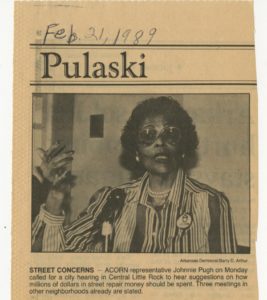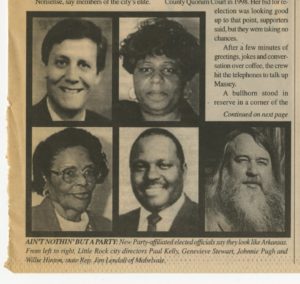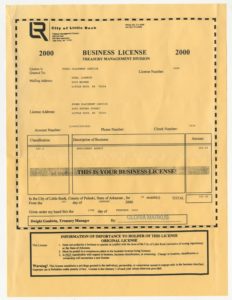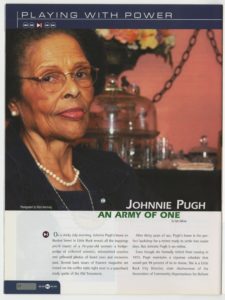calsfoundation@cals.org
Lessons in Archiving: The Johnnie B. Pugh Papers

Johnnie B. Pugh was born Johnnie Beatrice Newton to Moses and Odessa Newton in Snyder, Arkansas, on October 1, 1926. Pugh was a nurse, maid, community activist, political leader, and businesswoman. Unfortunately, I was unaware of Pugh, her major and minor contributions, or her personal and professional achievements until I decided to pursue a Master’s in Library and Information Science with a concentration in archival studies and wanted some practical experience in the profession.
At this time, I reached out to the chief archivist/Research Services Division manager, Brian Robertson, at the Bobby L. Roberts Library of Arkansas History & Art, which is the special collections branch of the Central Arkansas Library System (CALS). The Roberts Library houses the Butler Center for Arkansas Studies and the Encyclopedia of Arkansas.
Robertson and staff were generous with their space, time, and expertise in assisting me in my studies and practice. With my interest in representation of African Americans and Indigenous people in the archival records, Robertson identified and emailed me information about three small African American–related collections. One included newsletters from Arkansas Baptist College, the next had material related to a former school administrator at Little Rock Central High, and the third had material related to a former city director. I was interested in all three, so I asked him if I could decide upon my arrival as a volunteer and after reviewing each collection.

I began my archiving experience on March 18, 2022. With my busy work schedule and studies, the process was longer than usual but well worth it for the professional development. When I arrived at the Roberts Library, Robertson guided me to the secure archives on the third floor and presented each collection. I was most interested and inspired by the collection he stated as “material related to a former city director,” at first because the former city director was a woman, but ultimately because in her papers I saw small glimpses of myself and future young community leaders.
I was then introduced to Danielle Afsordeh, the community outreach archivist for the Roberts Library, who guided me on my experience through Johnnie B. Pugh papers. I began learning about Johnnie B. Pugh, a wonderful wonder woman who was a pioneer and member of the New Party in Arkansas. Pugh also helped petition for the Association of Community Organizations for Reform Now (ACORN) Recognition Day and supported increasing wages for CALS employees.
Taking me through the archiving process, Afsordeh instructed me to review each item within the collection, identify its contents, and locate a date or establish an approximate—or circa (ca.)—date. For example, City Director Johnnie Pugh obtained several certificates to enhance her political, professional, and personal leadership in serving the city of Little Rock, affiliated organizations, and prison reform efforts. So the collection could be organized chronologically, I needed to locate the year or search other archival records and databases such as Ancestry.com and the Arkansas Democrat-Gazette databases for circa dates.
After considering my instructions, I felt it would be easier to complete this task by utilizing notecards or index cards. Afsordeh provided large index cards that I chose to cut horizontally in half to save on the expense and prevent having to ask for more cards (because I am an undercover over writer…).
I reviewed all the items of the collection and identified a date for most. However, there were gaps in the papers’ content regarding City Director Pugh’s terms of service and her entrepreneurship. Therefore, Afsordeh suggested we take a trip down to the Roberts Library Research Room on the second floor and possibly establish a timeline for her community service and business. Afsordeh explained that the city directories would provide home ownership details, occupation or retired status, and other helpful information. Most importantly, going through them would provide experience with the research room and show me how its contents correlate with the materials in the archives.
Afsordeh and I found interesting information on Pugh, such as her years as a maid, which we concluded must have accounted for her income while transitioning from University Hospital to retirement and then to entrepreneurship. Pugh owned her home, and, according to the records, she utilized it as a placement service employment agency for several years. Afsordeh and I concluded our research room experience with the search of real estate records in the city directories to confirm her business details and its years of operation.

It was now time for me to label the folders and file the items of the Johnnie B. Pugh papers (the materials would be called “papers” rather than “a collection” because of the type of material donated and due to its very minimal photograph material of two items). Afsordeh began guiding me on labeling and filling the folders, on which I needed to write (in pencil) a description of the papers. For example, I would write “business records,” “certificates,” “political advertisements,” etc. on the tab of each folder and include the date range of the items within each folder. Afsordeh said she would write the box and file information but that I could go ahead and write the resource record or identifier on each folder, which would be BC for Butler Center, MSS for Manuscript, and the manuscript number components 09.15. Afsordeh also provided me with instructions and tips on filing large newspaper clippings and photographs, expanding the size of folders to comfortably contain large numbers of items.
After all that, she let me loose to experience archiving with the Butler Center on my own! I was thrilled and nervous all at the same time, but my passion for providing access to information about this wonderful wonder woman inspired me to do my best and ask about the rest. I completed the task assigned to me that day, but unfortunately, my work schedule and studies would prevent me from continuing my volunteer opportunity that day. Fortunately, though, Afsordeh asked if I could have volunteer access to ArchivesSpace to begin the process of creating public access to this archival record. Anna Lancaster, an archival assistant and the digital/AV specialist at the Roberts Library, emailed me a volunteer ArchivesSpace username and password to create the resource record for the Johnnie B. Pugh papers.

I was extremely grateful and excited for this opportunity to work with archival records in this capacity. Lancaster also emailed an audio file of a 2006 oral history interview with Pugh by Jajuan Johnson for me to listen to. From the interview, I was able to gather more biographical information on this powerful woman, “An Army of One” as Power Play called her. In this interview, it was also revealed that Pugh originally desired to be a midwife but it was recommended that she pursue nursing instead. She worked tirelessly to provide low-income residents with equal opportunities.
ArchivesSpace was a challenge, but it offered a great opportunity to practice and develop my skills in archival arrangement and description. The finding aid (available online here) was completed by the Archives Department, and thereafter Afsordeh asked if I would like to write about my experience in a post for the Roberts Library’s blog. At the time, I was overwhelmed with studies and work so I declined and asked if the opportunity would be available at a later date and THIS IS THAT DATE!
I am grateful to the Central Arkansas Library System, in particular the Roberts Library staff members, for giving me this archival experience. It was indeed an honor to help make this resource available for the benefit of researchers near and far. I gained much insight on arranging, describing, processing, and accessing archival records within this institution, and I hope to have the opportunity to do so again. Johnnie Beatrice Pugh is now a local “shero” of mine! My heart’s desire is that with access to her records, other young people find the power and passion to work together to make this world a better place.
By Candace Latrese Owens, clerk at the CALS Dee Brown Library and volunteer archivist
Note: Pugh died on July 13, 2025, at the age of ninety-eight.




